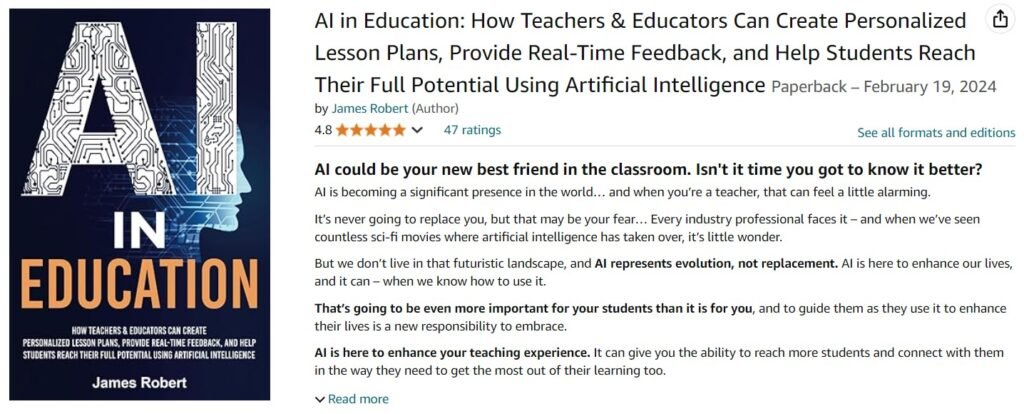The Best 5 AI Tools for Research Now
September 19, 2024 | by Jean Twizeyimana

Are you looking for ways to cut down your research time? Whether you’re a student, academic, or a data enthusiast, AI tools for research can revolutionize how you gather, analyze, and write research papers. From simplifying literature reviews to automating data analysis, these five AI tools will help you save time and get results faster.
Let’s dive into the top AI tools for automating your research process!
The Best 5 AI Tools for Research
1. SciSpace (for Literature Reviews)
Researching and summarizing literature is often the most time-consuming part of any project. SciSpace (formerly Typeset) makes this process easier by automating literature reviews. Simply enter your research topic, and SciSpace scours thousands of databases to find relevant papers, summarize them, and even generate citations in your preferred format.
Key Features of SciSpace:
- Automated literature review generation.
- Summarizes key findings from academic papers.
- Supports multiple citation formats, saving you hours of manual referencing.
Why it’s a game-changer: Instead of manually searching and reviewing papers, SciSpace does it all for you, identifying trends and key insights with minimal effort.
How to Use:
Input your research topic, and within minutes, SciSpace will create a literature review summarizing critical insights, complete with ready-made citations.
2. Elicit (for Research Questions & Paper Suggestions)
Formulating the right research question is often the hardest part of any study. Elicit is an AI-powered research assistant that helps you craft research questions and provides relevant papers to support your ideas. Whether you’re at the early stages of brainstorming or deep into your research, Elicit can help focus your study by providing different ways to frame your questions and suggesting relevant studies.
Key Features of Elicit:
- Helps craft research questions based on your topic.
- Suggests relevant academic papers for your study.
- Provides potential answers and solutions to your research queries.
Why it’s a game-changer: Instead of being stuck in the ideation phase or spending hours searching for the right papers, Elicit will speed up your process by offering relevant results tailored to your question.
How to Use:
Input a broad question related to your field of research, and Elicit will instantly suggest ways to refine your question and provide supporting literature to back it up.
3. GPT (for Writing Assistance)
Writing is one of the most critical aspects of research, but it can also be one of the most time-consuming. GPT is an AI language model designed to help you with writing, whether you need to draft, refine, or edit your research papers. From generating abstracts to rewriting paragraphs for better clarity, GPT is your AI writing assistant.
Key Features of GPT:
- Your first go to writing the draft of your research report.
- Can rephrase content for clarity and coherence.
- It can serve as a tool to check grammar and spelling errors.
Why it’s a game-changer: GPT saves you hours of writing and editing, producing high-quality content from just a few simple inputs.
How to Use:
Input a brief description of your research or an outline, and GPT will help generate
the text, whether it’s an introduction, abstract, or even specific sections. You can also use it to rephrase paragraphs for better clarity or to ensure that your writing is polished and professional.
4. CoLoop (for Data Analysis)
Data analysis can be overwhelming, especially when working with large datasets. CoLoop simplifies the process by offering AI-powered insights and analysis without requiring extensive coding skills. Whether you’re analyzing quantitative or qualitative data, CoLoop will help you uncover patterns, trends, and actionable insights in your data.
Key Features of CoLoop:
- No need for coding or advanced statistical skills.
- Analyzes large datasets quickly and efficiently.
- Provides clear, easy-to-understand insights from both qualitative and quantitative data.
Why it’s a game-changer: CoLoop automates the analysis process, saving you time on complex data tasks while providing insights that would typically require a data scientist.
How to Use:
Upload your dataset, and CoLoop will process the information to provide insights, patterns, and trends. It’s perfect for researchers who need fast results without digging into complex statistical models.
5. NVIVO (for Qualitative Data Analysis)
For qualitative researchers, NVIVO is one of famous ai tools for research. It is indeed your go-to software for analyzing unstructured data, like interview transcripts, focus groups, and even social media content. With the help of AI, NVIVO can automate the coding
Key Features of NVIVO:
- Analyzes qualitative data from sources like interviews, focus groups, and open-ended surveys.
- Supports multiple data formats, including text, audio, video, images, and PDFs.
- Automatically codes data using AI, suggesting themes and categories to save time.
- Conducts sentiment analysis to evaluate the tone of qualitative data (positive, negative, neutral).
- Provides data visualization tools, such as word clouds and cluster diagrams, to identify patterns.
- Integrates with survey platforms, like SurveyMonkey and Qualtrics, for easy import of survey data.
- Supports collaboration, allowing multiple team members to work on and share projects.
- Connects with external tools, like SPSS and EndNote, for seamless data import/export and reference management.
How it works: NVIVO uses AI to scan your qualitative data and automatically generate codes, themes, and relationships between the data points. This makes it easier to identify patterns, trends, and insights in your research. It’s particularly useful for researchers handling complex qualitative data sets.
Why you’ll love it: NVIVO saves you from manually coding qualitative data, which is often time-consuming and prone to error. With NVIVO, you can quickly organize and analyze vast amounts of unstructured data, allowing you to focus on drawing meaningful conclusions.
Are you ready to explore more advanced tools? The article, “10 Best AI Tools for Analyzing Survey Data,” lists tools for deeper analysis.
Best AI Tools for Research: Conclusion
Research doesn’t have to be a laborious, time-consuming process. With these AI tools for research — SciSpace, Elicit, GPT, CoLoop, and NVIVO — you can automate key parts of your workflow, saving you time and improving the quality of your research.
From conducting literature reviews to data analysis and writing, AI can help you tackle any research challenge faster and more efficiently. Try these tools today, and see how much easier research can be with the power of AI at your fingertips! Supercharge Your Research with AI!
Best AI Tools for Research: FAQs
1. What are the advantages of employing AI tools for research?
AI tools for research can save you time, streamline your research process, and help you access deeper insights by automating complex tasks like data analysis and literature reviews.
2. Are these AI tools for research suitable for all types of research?
Yes! Whether you’re working on quantitative, qualitative, or mixed-methods research, these tools can assist across various disciplines and research types.
3. Can I use GPT for more than writing assistance?
Absolutely! GPT can help with idea generation, structuring arguments, summarizing papers, and even checking for grammar and readability in your research papers.
4. How do I start using these AI tools for research?
Most of these tools offer free trials or affordable plans. Simply visit their websites, sign up, and start integrating them into your research process.
Are you excited to get started? Here are other popular AI tools that are making waves in the research community:
- Iris.ai: An AI science assistant that helps with literature exploration and summarization.
- SciSpace: Offers AI-powered literature search and paper summaries.
- Elicit An AI research assistant who can help formulate research questions and find relevant papers.
- Semantic Scholar: Uses AI to help you discover and understand scientific literature.
Related Articles
- Exploring The AI Qualitative Data Analysis in Surveys Now
- Revolutionize Your Research: Machine Learning Survey Analysis in 2024
- Latest AI in Survey Research: From Design to Analysis
- The Ultimate Guide to AI in Survey Research
- The Latest AI Sentiment Analysis Techniques for Survey Responses
- How To Overcome Survey Data Bias Using AI
- How To Leverage Natural Language Processing (NLP) for Open-Ended Survey Questions
AI and Machine Learning Tools
- Hands-On Machine Learning with Scikit-Learn, Keras, and TensorFlow
- Artificial Intelligence: A Guide for Thinking Humans


Try AI Tools in Your Research:
1. SciSpace (for Literature Reviews)
- Monthly Subscription: Get 20% off with the code
JEAN20Try SciSpace - Annual Subscription: Get 40% off with the code
JEAN40Try SciSpace











![MOUNT-IT! Sit Stand Monitor Desk Mount [Fits 32" Screens] Height Adjustable, Full-Motion Articulating Arm with Keyboard Tray and Cable Management (Black)](https://jeantwizeyimana.com/wp-content/uploads/2024/09/Sit-Stand-Monitor-Desk-Mount-Height-Adjustable-Full-Motion.jpg)
